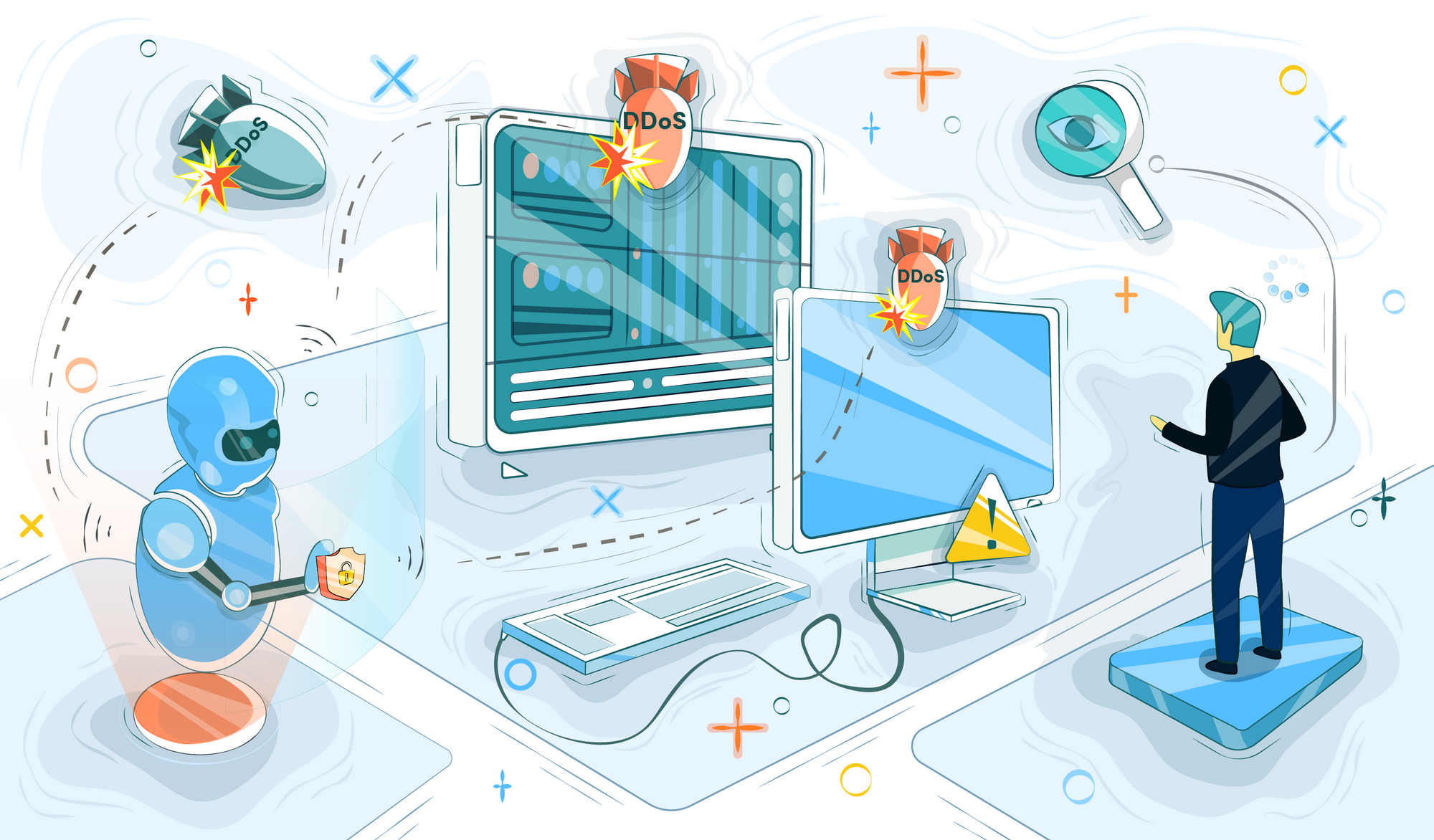Often, when we say that our advanced filters will guard the server from DDOS attacks, a client gets surprised. “Won’t it be your specialists monitoring my server all the time? Can we trust the computer to do this job?”
Well, we don’t leave the automated system alone protecting you from malefactors. Our specialists still control processes and step in when needed. But most of the job is done by smart algorithms.
And yes, we can trust a computer to safeguard servers from DDOS attacks. Here is why.
It’s the only logical thing to do
It’s been years since hackers executed DDOS attacks manually. Today they have programs that help them to automate threats and perform more sophisticated attacks much quicker. So if malefactors use automated systems to harm a destination server, can we really offer reliable and agile protection trying to do it manually?
The answer is no. We need to automate our security system to keep your servers safe. It’s virtually impossible to detect and mitigate the attack if we don’t involve algorithms that will automatically respond to the threat with a programmed action. Only with the help of computers, we can be sure no attacks are missed, and the server is protected.
Moreover, modern DDOS attacks don’t overload data transmission channels. Therefore, they’re harder to detect for a human. We’ve told all the nuances about the kinds of DDOS attacks in this article, and you can study it if you’re interested in details.
Now we will just tell you a quick fact – most threats begin with one activity – a simple UDP packet flood. Hackers use artificial intelligence to detect if it was successful or not and sends another flood if the first one failed. Then the system keeps analyzing the response of the target server and providing hackers with the data in the real-time mode so they can decide what to do next.
It’s impossible to compete with this approach using only human force. Machines must be confronted with machines. Even the best cybersecurity professional can’t always detect low-level DDOS attacks that are so popular among hackers today. And even if the specialist detects the threat, it’s impossible for them to respond to it as quickly as needed, considering that malefactors are using automated systems.
To prove our point even better, here are the stats. On average, it takes around 35 minutes to mitigate a DDOS attack manually. The fastest results are 20 minutes – specialists detected the threat right away, it was a known and basic kind of attack, and they quickly eliminated it. But if the attack is sophisticated, it can take professionals up to 105 minutes to stop it manually. That’s too much time, and quite likely, hackers will harm the server significantly.
Even the fastest result of 20 minutes is still too bad for fighting modern DDOS attacks. Twenty minutes are enough for malefactors to take the server down and even corrupt the data since they’re using automated systems.
Now let’s take a look at how quickly can automated protection mitigate an attack. On average, it will eliminate the threat over just 6 minutes. The fastest result is instant – the automated system is able to detect and stop the attack the moment it began. The slowest result is 20 minutes – that’s the best result of manual protection.
As you can see, the correct decision is to involve automation in anti-DDOS protection. So even though we’re used to thinking that we’re safe as long as a human is watching over our servers, it’s not true. Computers are much better at detecting attacks and reacting to them instantly. That’s why we trust them this job while controlling the activity of systems to make sure everything is working properly and step in if needed.
How automation can improve response time?
There are several advantages of automation we leverage to provide you with impeccable protection:
- The system detects attacks instantly – hackers don’t have that time gap when they’re kind of invisible.
- Traffic gets redirected automatically – the system redirects traffic to special filters that eliminate the flood.
- Reduced risk of escalation – since the attack was detected and reacted to quickly, it’s unlikely that it will escalate. And if it does, the system is still working.
- Zero-day botnet attacks detection – the system monitors the server activity all the time, so it’s effortless for it to spot when something is off and react accordingly.
- It provides us with intelligence – we can study the activity of the server to get insights on how we can improve the protection.
What do security specialists do?
“But if the computer can do everything, what humans do then?” – you might ask. It’s easy to fall into the belief that if there is a smart algorithm, then specialists can simply sit back and let it earn some profit for them. You shouldn’t be worried though – security professionals still have a lot of work to get done that’s worth the money you pay for their services.
First of all, they’re the ones who create all these smart algorithms that will later stand on the guard of your server’s security. Also, they install and make the anti-DDOS protection run on your server. And once the automated system is ready for work, it still needs supervision from specialists in case something goes wrong.
Moreover, our professionals constantly study data about the activity of clients’ servers to get insights on how to improve the system. So another job they do is that they constantly upgrade the algorithm so that it can compete with the activity of hackers and win every battle. It’s a challenging and effort-demanding work that requires a lot of skill and experience. So, as you can see, our security specialists don’t sit back while the system is running – they’re working hard, too.
Automated anti-DDOS protection is vital for fighting against advanced technologies hackers use. But it won’t be worth anything without the knowledge and experience of security specialists. Automated systems are the weapon professionals use to defend your servers from threats.

























